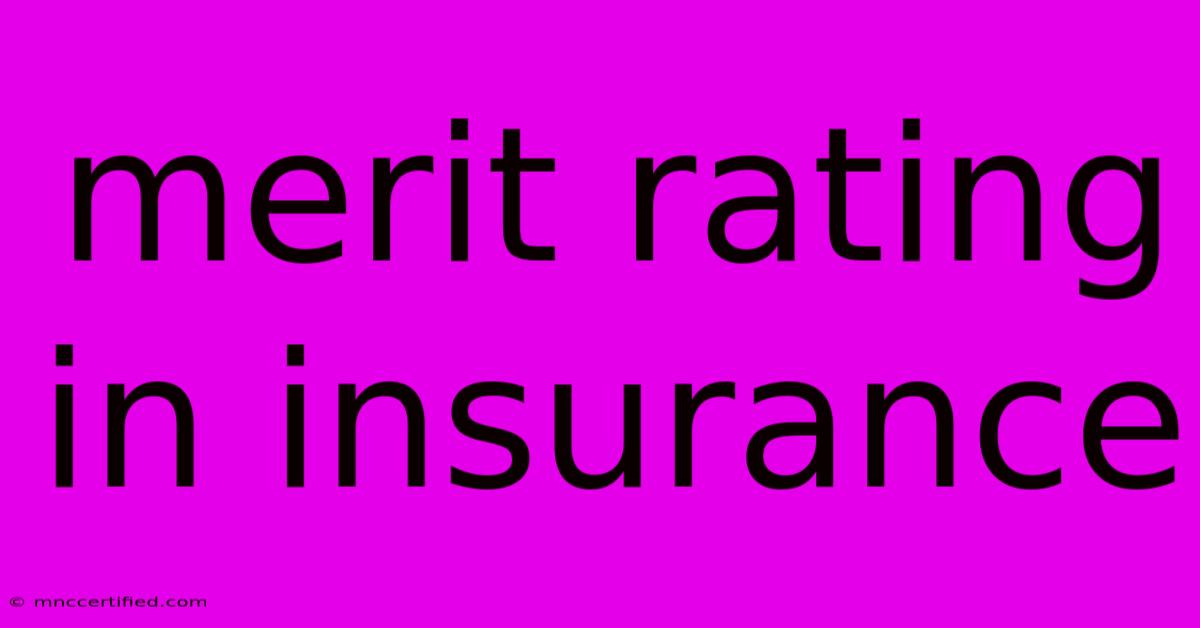Merit Rating In Insurance

Table of Contents
Merit Rating in Insurance: Understanding How Your Driving Impacts Your Premiums
Insurance companies use various methods to determine your premiums. One crucial factor is your merit rating, a system that rewards safe driving and penalizes risky behavior. Understanding merit rating is key to saving money on your car insurance (and potentially other types of insurance). This article will delve into the intricacies of merit rating, explaining how it works, the factors influencing it, and how you can improve your rating to lower your premiums.
What is Merit Rating in Insurance?
Merit rating is a system used by insurance companies to adjust your premiums based on your driving record. Unlike community rating, where everyone in a specific group pays the same rate regardless of individual risk, merit rating personalizes your premium. Essentially, it's a risk-based pricing model that reflects your individual risk profile. A clean driving record translates to lower premiums, while accidents, violations, and claims increase your premiums.
How Does Merit Rating Work?
The mechanics of merit rating vary slightly between insurance providers, but the core principles remain consistent. Your insurer uses a point system, assigning points for various driving infractions. These points accumulate over time, impacting your rating and, consequently, your premium. The more points you accumulate, the higher your premium will be. Conversely, a clean record with no points leads to lower premiums, often resulting in discounts and favorable rates.
Factors Influencing Your Merit Rating:
- Accidents: The severity and number of accidents significantly influence your merit rating. At-fault accidents generally carry more weight than accidents where you weren't at fault.
- Traffic Violations: Speeding tickets, reckless driving, and other moving violations add points to your record, increasing your premiums. The severity of the violation determines the number of points assigned.
- Claims Filed: Even if you weren't at fault, filing a claim can impact your merit rating. Insurers view claims as indicators of potential risk.
- Driving History: Your driving history is the cornerstone of your merit rating. A consistent record of safe driving is crucial for maintaining low premiums.
- Insurance History: Your past insurance history, including lapses in coverage, can also be considered.
Improving Your Merit Rating: Tips for Lower Premiums
Lowering your insurance premiums through a better merit rating is achievable with proactive measures:
- Defensive Driving: Practice safe driving habits. Avoid speeding, maintain a safe following distance, and always be attentive to your surroundings. Consider taking a defensive driving course; some insurers offer discounts for completing these courses.
- Avoid Traffic Violations: Obey traffic laws diligently. Even minor infractions can accumulate points and increase your premiums.
- Maintain a Clean Driving Record: A clean driving record is your best asset in securing favorable insurance rates.
- Shop Around: Compare quotes from multiple insurers. Different companies have varying merit rating systems and may offer more favorable rates based on your driving history.
- Consider Telematics Programs: Some insurers offer telematics programs, using devices or smartphone apps to monitor your driving behavior. Safe driving habits tracked through these programs can lead to discounts.
Merit Rating Beyond Car Insurance
While primarily associated with car insurance, the principle of merit rating extends to other insurance types, though the specific factors considered may differ. For example, home insurance might consider claims history related to property damage, while health insurance might factor in lifestyle choices and preventative care.
Conclusion: Safe Driving Pays Off
Merit rating is a critical component of your insurance premiums. By understanding how it works and taking proactive steps to maintain a clean driving record, you can significantly reduce your insurance costs and enjoy the benefits of safe driving. Remember, consistent safe driving is the best way to improve your merit rating and secure lower premiums in the long run. Regularly review your driving record and take advantage of opportunities to improve your standing with your insurance provider.

Thank you for visiting our website wich cover about Merit Rating In Insurance. We hope the information provided has been useful to you. Feel free to contact us if you have any questions or need further assistance. See you next time and dont miss to bookmark.
Featured Posts
-
Posh Midfield Diamond Player Analysis
Dec 10, 2024
-
Red Sky Insurance Reviews
Dec 10, 2024
-
Classic East Enders Character Back
Dec 10, 2024
-
Open Ais Sora Video Ai Released
Dec 10, 2024
-
28 Years Later Zombie Apocalypse Trailer
Dec 10, 2024